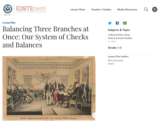
Learn about the checks and balances system of the three branches of the U.S. government.
- Subject:
- History
- Material Type:
- Lesson Plan
- Provider:
- National Endowment for the Humanities
- Provider Set:
- EDSITEment!
- Date Added:
- 07/07/2021

Learn about the checks and balances system of the three branches of the U.S. government.
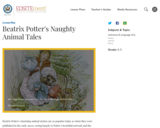
Through studying Beatrix Potter's stories and illustrations from the early 1900s and learning about her childhood in Victorian England, students can compare/contrast these with their own world to understand why Potter wrote such simple stories and why she wrote about animals rather than people.

In this curriculum unit, students look at the role of President as defined in the Constitution and consider the precedent-setting accomplishments of George Washington.
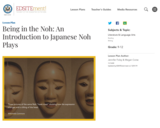
Noh, the oldest surviving Japanese dramatic form, combines elements of dance, drama, music, and poetry into a highly stylized, aesthetic retelling of a well-known story from Japanese literature, such as The Tale of Genji or The Tale of the Heike. This lesson provides an introduction to the elements of Noh plays and to the text of two plays, and provides opportunities for students to compare the conventions of the Noh play with other dramatic forms with which they may already be familiar, such as the ancient Greek dramas of Sophocles. By reading classic examples of Noh plays, such as Atsumori, students will learn to identify the structure, characters, style, and stories typical to this form of drama. Students will expand their grasp of these conventions by using them to write the introduction to a Noh play of their own.
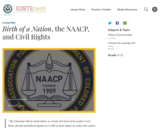
In this lesson students learn how Birth of a Nation reflected and influenced racial attitudes, and they analyze and evaluate the efforts of the NAACP to prohibit showing of the film.
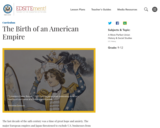
The emergence of America as a world power at the end of the 19th century and its acquisition of overseas territories.
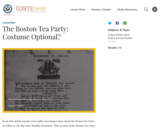
By exploring historical accounts of events surrounding the Boston Tea Party, students learn about the sources and methods that historians use to reconstruct what happened in the past.
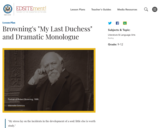
Reading Robert Browning's poem "My Last Duchess," students will explore the use of dramatic monologue as a poetic form, where the speaker often reveals far more than intended.

This lesson highlights the changing relationship between the city center and the suburb in the postwar decades, especially in the 1950s. Students will look at the legislation leading up to and including the Federal Highway Act of 1956. They will also examine documents about the history of Levittown, the most famous and most important of the postwar suburban planned developments.
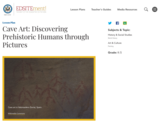
By studying paintings from the Cave of Lascaux (France) and the Blombos Cave (South Africa), students will discover that pictures can be a way of communicating beliefs and ideas and can give us clues today about what life was like long ago.
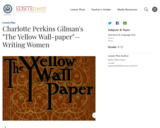
Using the landmark feminist short story "The Yellow Wall-paper," students will employ close reading concepts to analyze setting, narrative style, symbol, and characterization.
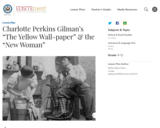
Charlotte Perkins Gilman's story "The Yellow Wall-paper" was written during atime of change. This lesson plan, the first part of a two-part lesson, helps to set the historical, social, cultural, and economic context of Gilman's story.
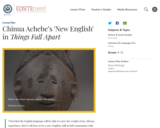
This lesson provides a Common Core application for high school students for Chinua Achebe's novel Things Fall Apart. Students will undertake close reading of passages in Things Fall Apart to evaluate the impact of Achebe's literary techniques, the cultural significance of the work, and how this international text serves as a lens to discover the experiences of others.
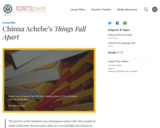
Nigerian born Chinua Achebe is one of the world's most well-known and influential contemporary writers. His first novel, Things Fall Apart (1958), is an early narrative about the European colonization of Africa told from the point of view of the colonized people.
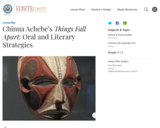
Students learn the linguistic strategies Achebe uses to convey the Igbo and British missionary cultures presented in the novel and how the text combines European linguistic and literary forms with African oral traditions.
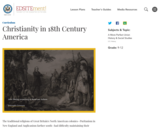
The traditional religions of Great Britain's North American colonies had difficulty maintaining their holds over the growing population. This did not, however, result in a wholesale decline in religiosity among Americans. In fact, the most significant religious development of 18th century America took place along the frontier, in the form of the Great Awakening. This curriculum unit will, through the use of primary documents, introduce students to the First Great Awakening, as well as to the ways in which religious-based arguments were used both in support of and against the American Revolution.
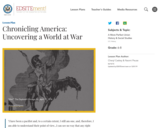
This lesson provides students with tools to analyze primary source newspaper articles about the Great War (1914"“1917) in order to understand public opinion regarding the U.S. entry into the war from multiple perspectives.
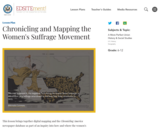
This lesson brings together digital mapping and the Chronicling America newspaper database as part of an inquiry into how and where the women's suffrage movement took place in the United States. Primary source newspaper articles published between 1911-1920 and maps from 1918-1920 are used to prompt student research into how women organized, the type of elections that women could participate in, and the extent to which the 19th Amendment transformed voting rights in the U.S.
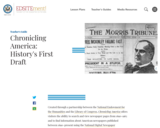
Created through a partnership between the National Endowment for the Humanities and the Library of Congress, Chronicling America offers visitors the ability to search and view newspaper pages from 1690-1963 and to find information about American newspapers published between 1690"“present using the National Digital Newspaper Program.
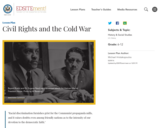
This lesson plan attempts to dissolve the artificial boundary between domestic and international affairs in the postwar period to show students how we choose to discuss history.